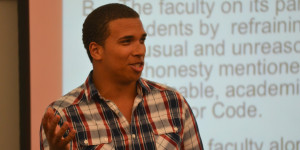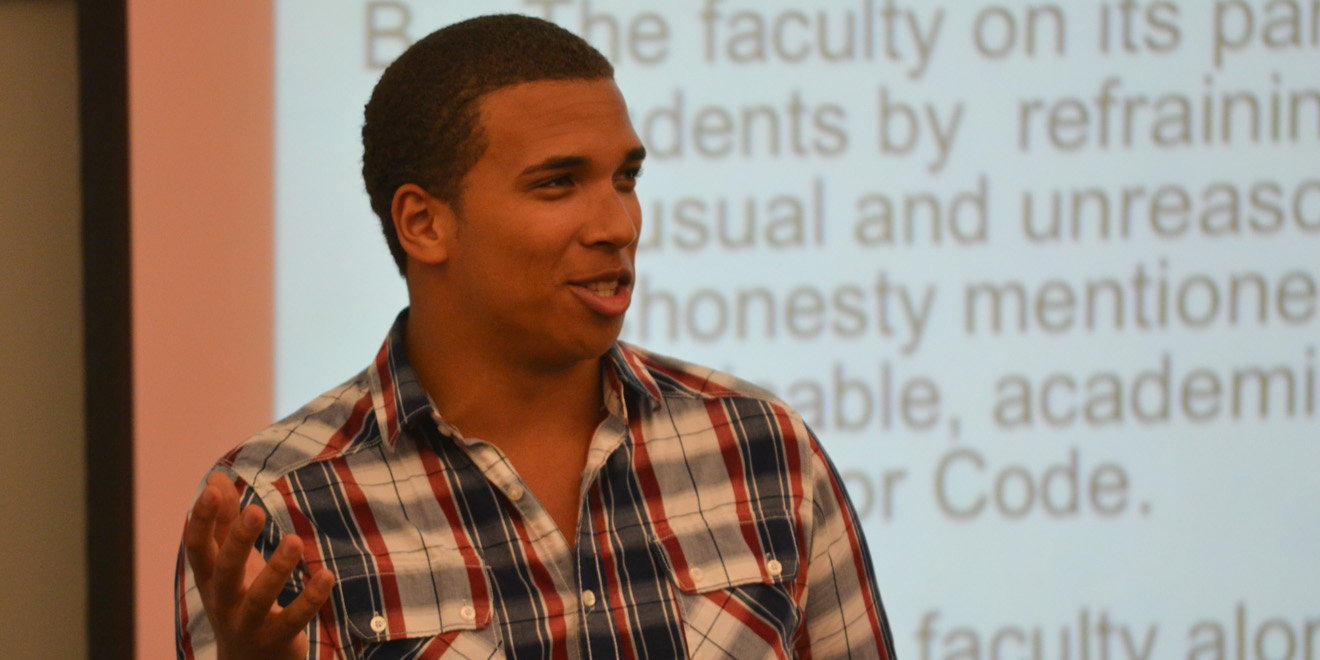
Tuesday evening, the Board of Judicial Affairs (BJA) held an open discussion titled “The Honor Code in the 21st Century.” Dozens of students, faculty and staff members shared their perspectives on current issues involving the Honor Code.
The University adopted the Honor Code in 1921 after a long student-led campaign and has undergone several revisions since, the most recent of which occurred in 1977. According to BJA co-chair Adam Horowitz M.A. ’10 Ph.D. ’16, the BJA saw a desire from the broader campus community to reevaluate the Honor Code in the context of changes to the University and society in the century since its enactment.
“We know the conversations are happening on campus,” Horowitz said. “We wanted to bring those to light. I think the variety and complexity of the things that people are thinking and talking about came out today.”
After brief introductions from Horowitz and physics professor Sarah Church, ASSU President John-Lancaster Finley ’16 commenced his moderation of the conversation. Finley began by posing the question of whether students and faculty felt comfortable with their responsibilities under the Honor Code in this day and age.
Several students expressed concern that they are sometimes not certain what behaviors constitute violations of the Honor Code. Some also stated that the policy of self-reporting was difficult and confusing to enforce.
Hattie Gawande ’18 recounted an incident in her introductory economics course in which the professor accidentally posted solutions to an assignment before its due date.
“None of the students notified [the professor],” Gawande said. “He told us, ‘If I could go online to see who looked at the answers before turning in the solutions, that would be a violation of the Honor Code for not actively alerting me.’ That surprised many of the students.”
A few students commented that faculty give “mixed messages,” trusting students with certain freedoms but restricting them in others. For example, proctoring is not permitted under the Honor Code, yet many professors do not permit writing with pencil during exams for fear of students changing answers after the fact.
Faculty members argued that explicitly stating every behavior that is and is not against the Honor Code would be an undue burden.
The discussion then moved toward potential reform options. Math professor Brian Conrad along with several other faculty members supported allowing the proctoring of exams, citing reasons such as increasingly large class sizes, the inconvenience of asking questions during exams, poor testing facilities and alleviating the pressure among students to self-report other students.
“It’s more unpleasant than it has to be,” Conrad said. “As classes get bigger and bigger, [not permitting proctoring] is a burden on the administration of the exam.”
Computer science professor Eric Roberts addressed the recent growth in computer science Honor Code violation cases, including a string of cases in CS 106A last fall. He argued that Stanford’s trust-based policies are a major reason why the computer science department’s introductory classes are so successful. The Honor Code allows CS 106A and CS 106B to use the same high-quality, robust assignments each quarter, as professors and section leaders can trust that students will not cheat. However, absent that trust, Roberts expressed concern that the computer science department would have to move toward more emphasis on exams over assignments.
“If you can find a way to make people think, ‘I’m getting a lot for this honor code,’ they’ll take it more seriously,” Roberts said. “In the absence of trust, courses won’t be as good.”
Computer science professor and CS 106A lecturer Mehran Sahami ’92 M.S. ’93 Ph.D. ’99 added that without a strong belief in the Honor Code, the campus culture would move from a culture of learning to a culture of assessment.
Similarly, Church said that a breakdown of trust in the Honor Code between faculty and students would lead to worse learning outcomes.
“It’s completely impractical for me to police your use of those solutions,” she said. “But if you use those solutions to do your homework you will fail your exam.”
The event concluded with an informal poll of its attendees. Horowitz first asked whether the participants felt that they had a firm grasp on what the Honor Code means. All but one of the faculty members responded affirmatively, compared to about two-thirds of students. Horowitz then asked whether attendees would like to see proctored exams. The majority of faculty responded affirmatively, while most students responded negatively or said they were uncertain.
While the open forum discussion was often critical, BJA co-chair Catherine Glaze ’80 J.D. ’85 said that she got the sense that the University still broadly believes in the Honor Code, despite it having been almost a century since its enactment.
“That was very interesting to me,” she said. “I think it’s good to look at the way we do things periodically and to make sure we’re keeping with the times. I did all my undergrad exams on a blue book and wrote papers on a typewriter, and now law students take exams on their laptop. We have to make sure we’re keeping up to date but also keeping our values. In the end, it’s a conversation about values.”
Contact Victor Xu at vxu ‘at’ stanford.edu.
